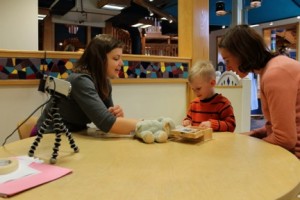
Graduate student from the Early Childhood Cognition Lab, Nadia Chernyak, conducts a study with child participant. Photo by Sciencenter.
Dr. Tamar Kushnir, professor and Director of Cornell University’s Early Childhood Cognition Laboratory (ECCL), and Michelle Kortenaar, Director of Education at the Sciencenter, were recently awarded a 2014 Innovative Pilot Study seed grant from Cornell University’s Bronfenbrenner Center for Transitional Research (BCTR)
to implement their project The Science Word Scavenger Hunt: Design, Implementation, and Assessment of a Simple Interactive Museum Experience to Engage Young Children and Their Families in Science Learning.
The goal of the Innovative Pilot Study Program is to encourage shifting social and behavioral research into real-world practice and policy. The BCTR awards approximately four to five pilot grants a year for up to $12,000 each.
The Science World Scavenger Hunt is an extension of the work done by Dr. Kushnir and Ms. Kortenaar on their SENCER-ISE project Science from the Start: Engaging Researchers, Undergraduates and a Science Museum to Reach Early Learners and Set the Stage for STEM Learning.
In the Science from the Start project, Cornell University undergraduates in Dr. Kushnir’s Concepts and Theories in Childhood course study early childhood cognition, designprototype signage for Sciencenter exhibits (this past semester, these signs dealt with the concept of water), and observe visitor interaction with the signs and exhibits. To encourage visitors to engage more with the signage created through this project, a scavenger hunt with the theme of “water” is being introduced.
When making their visitors observations, the students took an unobtrusive “fly on the wall” approach. The BCTR grant provides the funds to allow formal data collection by ECCL researchers on how children and parents — some taking part in the scavenger hunt, others not — interact with each other and the exhibits. Researchers from the ECCL will videotape parent-child interactions at different exhibits throughout the Sciencenter and code the resulting data.
A National Science Foundation grant will be written for the summer of 2015 based on this pilot data.
As Dr. Kushnir and Ms. Kortenaar say in their grant proposal, researchers have studied the mechanisms of childhood learning in controlled laboratories, but little focus has been put on how learning takes place in real-world environments.
Ms. Kortenaar states, “By partnering with Cornell’s Early Childhood Cognition Lab, the Sciencenter seeks to enhance the early childhood experience at the museum and also to empower parents, educators, and other caregivers to take an active role in their children’s early learning. Through this partnership, we are succeeding on both counts.” She goes on to say, “Our youngest guests have a fun-filled learning experience, while their parents and caregivers are inspired to engage their children in ways that complement their children’s natural curiosity.”
